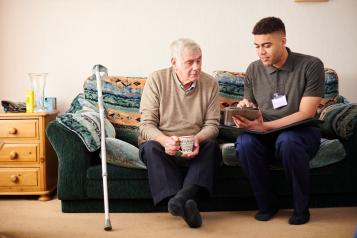Dementia carer: As a carer I get just 3 hours’ sleep a day
I am determined to provide the best possible care for Georgina, at home, with me, until the end.
Reviewing social care support
“I have always been determined to look after Georgina for as long as possible at home. Adult social care aims to review your care and support regularly. You can also ask for a review any time your situation has changed.
"As Georgina has insufficient cognitive functionality to participate in her Social Care Review, as her registered carer, and as Attorney for Georgina I am responsible for representing her needs during the review.
"We have an annual review conducted by Wiltshire Council which covers the issues raised at the previous review, changes that have developed over the ensuing 12 months and, as a result, what additional support is required.
"We have been fortunate to have had the same reviewer for the past four years. It is important that the reviewer is familiar with the history of Georgina’s condition and support needs. It concerns me that other individuals may not have this continuity, and that support issues from previous reviews may not be actioned as agreed.
Unresolved issues
“Georgina has developed a pronounced lean to the left when sitting or standing, which may be the result of a minor stroke. She also has her chin permanently on her chest. This impacts on her ability to breath comfortably, to chew, and to swallow. It also affects her ability to speak (even though it rarely makes sense).
"Approximately six weeks ago I asked the surgery for a referral to the Occupational Therapist for advice, to date I am still awaiting a response. I cannot contact the therapist myself, there has to be referral from the GP. In the absence of advice, Georgina requires constant one to one assistance with eating and drinking and safe mobility.”
Inadequate support from agency carers
“At each review I have raised the issue of agency care companies not being able to provide the agreed care, despite their insistence that they could. This results in much reduced agency carer support (up to 20% some months) for Georgina, which then impacts on me. Adult social care and regulatory authorities need to have tighter control over care agencies, and their ability to provide services.
I am responsible for all Georgina’s personal care. She is now doubly incontinent and may require changing up to four times in 24 hours. This is explained carefully to the care agency and to the individual agency carers. Apart from live-in agency carers, most agency carers do not have experience of supporting personal care. When they realise what is involved, they decline to attend.
It is a fact that almost all agency adverts for staff include the sentence ‘no experience required’ or ‘full training will be provided’. Again, I feel that this is not acceptable, and results in a lower quality of applicant, that the quality of the training is subjective, and that Adult Social Care Services and the Care Quality Commission should have tighter control over this.”
The impact on the carer
“When inadequate support is provided it has a huge impact on me as a carer. My ability to have any sort of a life away from caring for Georgina comes to a halt, and any gap in support has to be filled by me. This includes one to one support with meals, personal care and constant observation to ensure she is safe, not just during the day, but in the evening and overnight, when she is in bed, but may be restless or agitated. This is both time consuming and tiring. My average sleep over 24 hours is 3.5 hours. My average ‘deep’ sleep is 25 mins.”
Social isolation
“Due to the inconsistency and unreliability of agency carers, I have now had to withdraw from, or resign from all the external community health and social care activity that I was previously actively involved in, benefitted from and contributed to. This is now creating an increasing sense of social isolation, which can only get worse.”
Payments don’t cover care
“Georgina receives Direct Payments to pay for agency carers. This amount has not increased for the last three years. Agency hourly fees have increased substantially over this period and are now well in excess of the amount received in Direct Payments. To continue using the same agency, at one point I would have had to find up to £10,000 per year to fund the difference. The solution has been to find an agency which would accept the Direct Payment amount, with all the issues that raises.”
When inadequate support is provided it has a huge impact on me as a carer.
Determined to get the best possible care
“I am fortunate that I have developed a good working relationship with Wiltshire Adult Care Services over the past five years with regards to Georgina’s care needs. They have been understanding and flexible, responding to most of the issues that I have raised.
"That relationship is due, in part, to my determination to provide the best possible care for Georgina, at home, with me, until the end. I have no compromise in this, and social care services are supportive of this, and use ‘us’ as an example of where, with the right support, care at home can be successful and preferable.
But not everyone has the determination that I have. Not everyone has the ability, time or resources to do the research to find out the information they require to get the correct support.”
The changes David would like to see to help other carers
Early Diagnosis
“Having an early diagnosis is more likely to encourage the individual, and those who will have ultimate carer responsibility, to seek out and access the various support mechanisms that are available, rather than waiting for the condition to develop, and then having to run to keep up.”
More accessible and understandable information
“People should be able to easily access information on what support is available, when in the process and by whom.
All of the support services need to be more out there, promoting themselves, what they do, what support they provide and how to access it.
I have met many dementia carers, who have been caring for many years, who still do not know the basic process for getting support, for example, first of all you need to register as a carer with your GP. That should set the ball rolling.”
Take away the layers of bureaucracy
“There are far too many layers of bureaucracy. For example, NHS dental treatment, wheelchair provision and incontinence products all require at least two layers of third-party involvement.”
Better training and recruitment of care agency staff
“The role of care agencies and their staff needs to be better promoted by social care, Clinical Commissioning Groups, the Care Quality Commission, the NHS and GPs. Agency care workers (after some initial training/shadowing possibly) are left to attend their clients on their own, possibly not having been to that client before.
They may have minimal information about what the visit requirements are - for example who has responsibility for medication, meals and drinks, personal care, and companionship? This is all provided in just 30 minutes and, usually, on the minimum wage and zero hours contracts.”
Dementia care
Are people are getting the right dementia support as their condition deteriorates?
Read our research to find out more.


